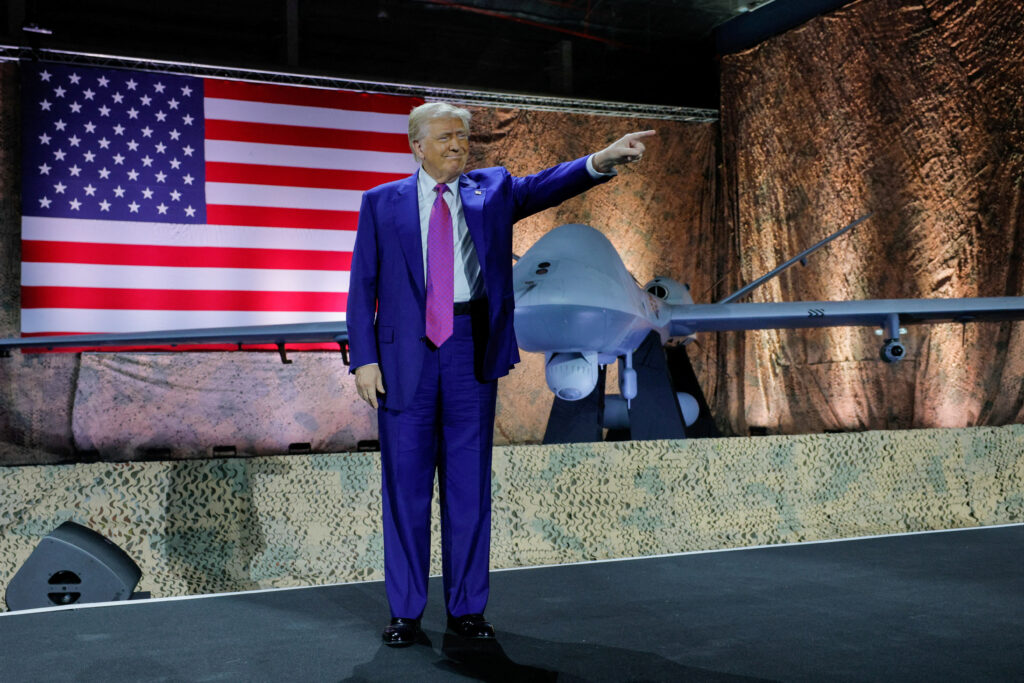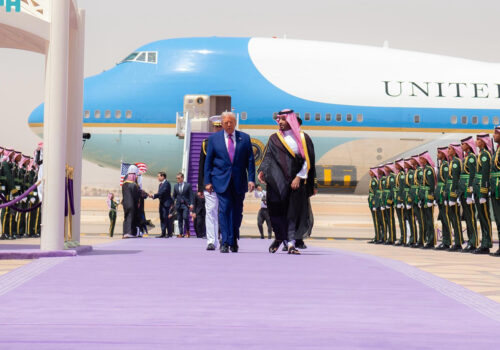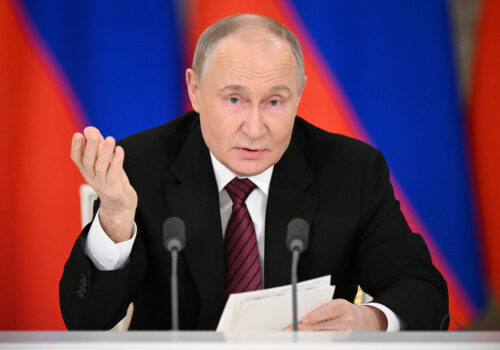This week has been vintage Donald Trump: disruptive, transactional, and unafraid to defy convention. From a geopolitical standpoint, the US president’s trip to the Middle East could prove to be one of the most significant of his two terms in office. That depends, however, on whether Trump now follows up with a decisive move against Russia’s Vladimir Putin.
Here’s how to look at this historic opportunity.
Trump’s surprise decision to lift US sanctions on post-Assad Syria should be seen in combination with his administration’s less-ballyhooed move to remove curbs on the sale of advanced artificial intelligence (AI) semiconductor chips to the United Arab Emirates (UAE) and Saudi Arabia. Both are smart moves of underappreciated consequence on a global chessboard.
First, let’s talk Syria.
Trump had nothing to do with the December 8 fall of dictator Bashar al-Assad, which came in the final days of the Biden administration, ending fifty years of repressive Assad family rule. For Trump, it also marked an unanticipated geopolitical inflection point, whose origins I explained here a few days later. It was a powerful setback to Iranian leaders and Putin, who had saved the Assad regime through direct military intervention since 2015.
By lifting sanctions now in such high-profile fashion in Riyadh, Trump has seized high diplomatic ground at low cost. He rewarded both Middle Eastern and European allies—particularly the United Kingdom, Saudi Arabia, and Turkey—who had urged him to make the move. At the same time, he can slam the door on any Russian attempt to regain regional influence.
Moscow spent years propping up the Assad regime, but it collapsed anyway, in no small part because Russia moved military assets from Syria to support its Ukraine war. Russia didn’t just lose a client in al-Assad; it also lost global standing by giving up a Middle East foothold through which it exercised regional influence. Trump should follow up by proposing a regional security pact excluding Russia and China—and building upon his Abraham Accords.
Now, let’s talk artificial intelligence.
What do advanced computer chips have to do with Syrian sanctions relief? If the Syria move is about checkmating Russia, then the chip move is about outmaneuvering China. Do both at the same time, and you frustrate the “no limits partnership” that Putin and Chinese President Xi Jinping declared in opposition to Washington back in February 2022.
President Joe Biden’s move late in his administration to limit UAE and Saudi access to the United States’ most advanced chips via the “AI Diffusion Rule” was designed to limit the technology’s proliferation to China. But in the region it was perceived as a slap in the face of countries willing to invest tens of billions of dollars in American AI companies and their infrastructure. A Gulf official told me some colleagues in his country wondered whether they had made the right bet as they confronted US restrictions, even as DeepSeek raised concerns that China over time could match or surpass US capabilities.
Both Trump moves are calculated gambles with sound logic behind them.
Regarding Syria, Trump has reckoned it’s worth taking a chance on the new leadership in Damascus and giving it a “fresh start.” That’s even though new President Ahmed al-Sharaa, who led the offensive against Assad, was designated by the United States as a terrorist alongside his Hayat Tahrir al-Sham movement, given their historic ties to al-Qaeda. Al-Sharaa renounced his ties to al-Qaeda in 2016 and now commits that his regime will be inclusive and respect all his country’s religious and ethnic sects.
The jury is out—but a good outcome is more likely with Washington involved.
Regarding artificial intelligence, Trump is betting that the Emiratis and Saudis will protect cutting-edge US technology from leaking to China, as the Biden administration feared. What he’s gained in return are arguably the deepest-pocketed investors in the world—who at the same time hope to maintain close ties to Beijing, their largest fossil fuel customer.
With an accelerating tech race this uncertain and with the stakes so high, give Trump credit for deciding rather than dithering.
A third news story this week may seem unrelated—that of the first direct peace talks between Ukrainian and Russian officials in Istanbul—but it’s not. Trump has expressed concern that Putin may be “tapping [him] along.” That’s a welcome, if belated, sign that he and his administration recognize that they are being played by a wily adversary who believes all of Ukraine will fall to him if he can buy time and neutralize US support for Kyiv.
It’s time to call Putin’s bluff amid his failure to engage seriously in peace talks that would preserve Ukraine’s sovereignty, security, and freedom to join Western institutions. Good next moves would be more sanctions against Russia, more weapons for Ukraine, and a backstop for European military support for Ukrainian security guarantees.
A Putin failure in Ukraine, coming on the heels of his Syria failure, would be a geopolitical triumph of historic consequence and perhaps even worth a Nobel Peace Prize for Trump, something I wrote about late last year.
Not long after I wrote that, a Middle East official told me that by upending the geopolitical chessboard, Trump has the opportunity to achieve unanticipated gains, particularly in great power politics. The danger, he said, was that Trump pays too little attention to the secondary consequences of his decisions. The economic cost of his “liberation day” tariffs, and his decision to back off their most extreme version, underscored both this Trump peril and his ability to self-correct.
If Trump will now also self-correct on Russia, he can again confound his critics, showing that he can be disruptive, transactional, convention-defying, and geopolitically shrewd, all at the same time. Trump shouldn’t miss this historic opportunity.
Frederick Kempe is president and chief executive officer of the Atlantic Council. You can follow him on X: @FredKempe.
This edition is part of Frederick Kempe’s Inflection Points newsletter, a column of dispatches from a world in transition. To receive this newsletter throughout the week, sign up here.
Further reading
Tue, May 13, 2025
Trump’s remarkable Middle East tour is all about striking megadeals and outfoxing China
Inflection Points Today By Frederick Kempe
The Trump administration would rather swim in a stream of Gulf investments than get bogged down in the region’s enduring problems.
Tue, May 13, 2025
How much longer will Putin be allowed to continue stalling for time?
UkraineAlert By Peter Dickinson
President Trump has made a legitimate effort to broker a generous peace, but the time has now come to acknowledge that Putin is not negotiating in good faith and will only respond to the language of strength, writes Peter Dickinson.
Tue, May 13, 2025
Experts react: Trump just announced the removal of all US sanctions on Syria. What’s next?
New Atlanticist By
Our experts provide their insights on how the removal of US sanctions on Syria would affect the country and the wider region.
Image: US President Donald Trump gestures while delivering remarks to US troops during a visit to Al Udeid Air Base in Doha, Qatar, on May 15, 2025. Photo via REUTERS/Brian Snyder.



